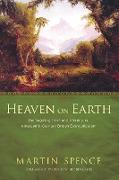- Start
- Heaven on Earth
Heaven on Earth
Angebote / Angebote:
In nineteenth-century Britain, a large number of prominent Anglican and Presbyterian Evangelicals rejected the idea that salvation meant "going to heaven when you die." Instead, they proposed that God would establish his kingdom on earth, renewing the creation and reanimating embodied humans to live in a world of science and progress. This book introduces the writings and activities of these women and men, among whom were counted the ardent social reformer Lord Shaftesbury, the highly-respected clergyman Edward Bickersteth, the popular author Charlotte Elizabeth Tonna, and the General Secretary of the Evangelical Alliance, Thomas Rawson Birks. The book shows that the catalyst for such theological revisionism was the end-times doctrine known as "premillennialism." While commonly characterized as a gloomy and sectarian belief, the book argues that premillennialism in Victorian Britain was actually an optimistic and often liberalizing creed. It dissolved older Evangelical assumptions about the dissimilarities between time and eternity, body and soul, heaven and earth. The book demonstrates that, far from being eccentric pessimists, premillennialists were actually pioneers of trends in nineteenth-century Christian theology that stressed the importance of the incarnation, prioritized social justice, and even entertained the idea of universal salvation.
"Moving across disciplines, and balancing nuance and precision with cultural breadth, Martin Spence's Heaven on Earth provides a rich and compelling account of evangelical millennial thinking in the crucial period in which it evolved into its modern forms."
--Crawford Gribben, Professor of Early Modern British History, School of History and Anthropology, Queen's University, Belfast, UK
"In this remarkable book, Martin Spence provides a valuable reassessment of the place of millenarian beliefs in nineteenth-century British Evangelicalism, demonstrating how it was that such premillennialists as Lord Shaftesbury could also be activists and reformers, committed to social improvement. Exploring his theme within the broader cultural context of Romanticism, Spence's work contributes significantly to a new understanding of British Evangelicalism and progressive thought during the height of Britain's power and influence in the world."
--Stewart J. Brown, Professor of Ecclesiastical History, University of Edinburgh, Edinburgh, UK
Martin Spence is Associate Professor of History at Cornerstone University, Grand Rapids, Michigan. He has taught global, European, British, and Christian history at seminaries and Universities in Britain and the United States.
Folgt in ca. 10 Arbeitstagen
